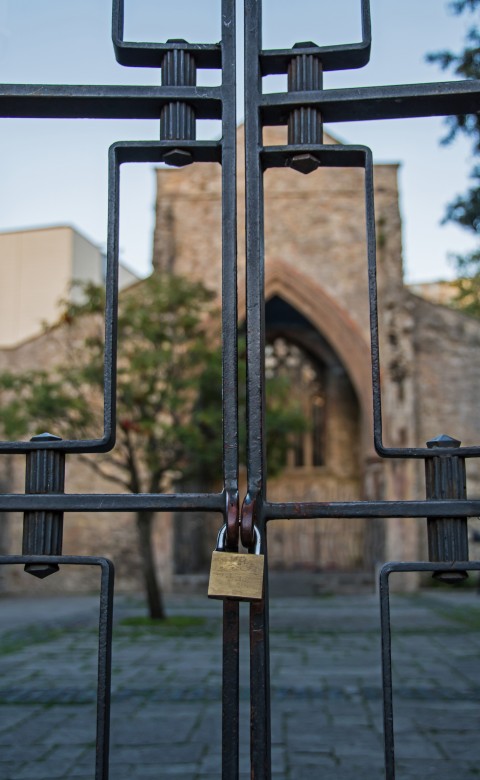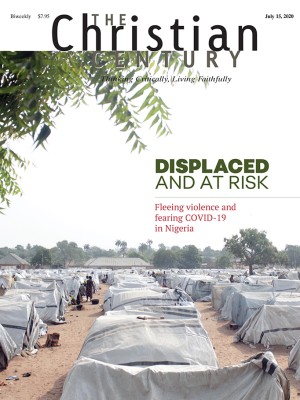Why are so many white Christians suddenly standing up for racial justice?
It might help that our pews aren’t available to sit in and pray.

The weeks since the killing of George Floyd have seen some of the most sustained protests in US history, with swelling outrage at racial injustice and a growing acknowledgment of the reality of systemic racism in policing and throughout society. We in the church may celebrate the promise of justice so rapidly pooling and beginning to roll down. Yet as a pastor of a majority white church, I also wonder what it means that this has happened at this particular time—when so many of our church buildings are closed.
American voters’ support for the Black Lives Matter movement increased almost as much in late May and early June as it had in the previous two years, according to a June 10 New York Times poll. A Washington Post poll the day before found that 74 percent of Americans support the protests. These numbers are reflected in daily headlines of mainstream acceptance, everywhere from NASCAR to the NFL to the block letters leading down the road to the White House. As many have noted, at worst this is performative allyship seeking to keep pace with inevitable change. At best it is a long anticipated and worked-for generational moment to enact substantive reform. In any case, it is a markedly accelerated public shift that represents a great deal of social-political power.
Read our latest issue or browse back issues.
Such progress is owed primarily to the expertise and long, hard work of black activists, organizers, and leaders—as well as to the legacies and loved ones of Breonna Taylor, Ahmaud Arbery, George Floyd and the countless others whose names we say. Some have argued that the power of the moment is also tied to the conditions of COVID-19 quarantine, which Black Lives Matter cofounder Opal Tometi describes as “a period that has been deeply personal to millions of Americans and residents of the United States, and that has them more tender or sensitive to what is going on.” This period of heightened awareness has afforded many people—especially late-arriving white allies—more time to listen, learn and act. That’s because of altered schedules and closed buildings at schools and offices—and churches.
It makes me wonder if the acceleration of the movement among white people in this moment is in part because so many historically white churches have closed their buildings. This has left them unable to respond in ways they traditionally have—ways that historically have served to moderate tension.
When faced with unrest over racial injustice, white churches have often turned to conventional modes of response that prove incomplete on their own. Education is one impulse, taking the form of our book clubs, reading groups, and self-studies. Dialogue is another: in cities where churches still hold convening power we might pull together a panel of experts, or engage city leaders, or—as my congregation has done at various points in its history—host a conversation with a partner church that is majority black.
The most common institutional response is prayer. We pull out the candles, complete with their wax drippings from the last community prayer service. “Under normal circumstances,” a clergy colleague said recently, “without quarantine, we’d all be at one of our churches for a vigil.”
These traditional responses in part reflect traditional virtues of majority white institutional life—including a focus on civility. Historian William Chafe discusses this sort of civility in his study of the civil rights movement in my city of Greensboro, North Carolina. He calls it “the cornerstone of the white progressive mystique . . . encompassing abhorrence of personal conflict, courtesy toward new ideas, and a generosity toward those less fortunate than oneself.” According to Chafe, such civility was ultimately the primary obstacle to civil rights progress in Greensboro and similar cities in the 1960s. Among its primary adherents were white Christians.
In response to racial injustice, white churches have often prioritized civility, neutralizing the more radical and costly message of justice. With an exclusive emphasis on education, for instance, we end up approaching racial injustice as though the primary problem is personal ignorance that can be solved through learning, rather than systemic injustice that must be solved through reform. By emphasizing dialogue, churches can implicitly advance the notion that our chief aim is friendship and reconciliation, rather than wholesale change. And by lighting a candle and praying with our words, it is easy to stop short of Frederick Douglass’s charge to pray with our feet and our bodies, too.
With such traditional modes of response, historically white churches—like many other established institutions—have repeatedly had a moderating influence on movements toward justice, as noted so pointedly by Martin Luther King Jr. in his “Letter from Birmingham Jail,” in which he famously addresses “the white moderate.” King’s letter is specifically addressed to white pastors of downtown churches in Birmingham, who had issued him “A Call for Unity” urging “peace.” King points out that they spoke of peace but really sought order—the absence of tension rather than the presence of justice. “More light, less heat,” such pastors might say in the vernacular of moderation today, forgetting that the light will scorch us if we allow ourselves to stand close enough.
In recent weeks, lacking access to buildings and the well-established responses they host, historically white churches have been less able to keep a distance. We’ve been less sheltered, less apt to respond in traditional ways, and in turn have had less power to moderate the tension and thereby neutralize the moment. As a deliberately decentralized and diffuse movement, Black Lives Matter is not assigning essential roles to religious institutions. Majority white churches can only play a useful role when they’re willing to leave the safety of conventional response.
In some cases, this has happened. Instead of merely dialogue, churches have embraced a clear, singular message of change. Instead of panel discussions, there are lists of clearly articulated expectations and demands. Instead of softened calls for unity, there are bold calls for justice. Instead of vigils, people are attending protests.
Of course, white Christians could have been doing so all along. “It’s great that you’re here, white clergy,” one pastor and organizer said from the stage at one of Greensboro’s massive protests, “but stop asking what you can do. Look around. You see what to do.”
If we can see what to do in this moment, it’s partly because the walls of our buildings aren’t obscuring our view. The protests in many cities started the weekend of Pentecost, recalling how the Spirit falls on the people in the streets of the city. In John’s version of the Spirit’s coming, the disciples are waiting in the upper room, holding vigil behind locked doors. But in Acts, the doors are open. The room is empty. The disciples have poured out into the city to find that this is where people are speaking new languages, dreaming new dreams, and standing up to proclaim the world as it can yet be.
Who knows what would have happened if they’d stayed inside? My hunch is it all would have happened without them.
And who knows what might have happened if we’d been able to be in our church buildings in these weeks of momentous change? All we know is that we weren’t. It’s happened while our church buildings are closed. What’s left is to determine what will happen when they open again.
A version of this article appears in the print edition under the title “No pews to sit in.”





